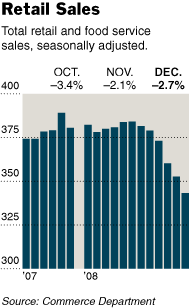
No surprise in today's numbers, although, apparently Wall Street felt they were worse than expected. But, as much as my "research friends" like to disrespect anecdotal evidence, if you were out and about during the holiday shopping season you would have known the
retail sales numbers were going to be bad.
The most impressive, so to speak, number is that retail sales are down slightly over 9% from December last year. So while the down 2.7% from November may not seem like a lot, 9% does. It says the recession has been going on for over a year before anyone in "officialdom" declared that we were technically in one.
There are two things that concern me. The fact that while we all knew something was wrong with the economy, policy makers had to wait until, what, some archaic and ridiculous formula told them something was wrong? Is there something about fiddling while we are standing in the unemployment line about this?
But more importantly is the consumption issue. Imagine a hamster in one of those wheels, running and going nowhere. It seems to me that is what we are in right now. Many pundits say there is a lack of confidence in the economy. They refer to this lack of confidence regarding banks lending, investors who still have money, investing, and consumers spending on stuff. Well, no kidding there is a lack of confidence. We are watching in real time what many of us read about in history books. Doesn't exactly instill confidence in our economy.
But seriously, what the pundits mean is that if only, somehow, consumers feel they have more money and banks feel they are not bleeding in bad loans and investors feel they will get at least a reasonable return, the economy will magically become healthy. Thus, the stimulus. The idea behind the stimulus checks the summer of 2008 was a belief that if consumers feel they have more money they will begin to spend and the retail sector which accounts for over 80% of our national economy (yes, you read that right) will bounce back. I don't know about you, but somehow $600 didn't instill a lot of confidence. Instead, Americans apparently did what they should have done, pay down debt or save the money! So now the stimulus idea is to try the same thing, but with tax credits, in other words no cash, and to create some "shovel ready" jobs.
Perhaps the idea being that if we think something is being done, we will I suppose, go out and spend money.
But here is the rub. I don't think Americans have that much money. Credit cards are tapped out and no one is getting refinancing loans on their homes to pay off the credit cards so they can go at Costco one more time. And what savings Americans have left is not being touched out of fear that we may need it. In other words, I don't think the issue is blithely about confidence, I think the issue is that deep down inside we don't really think the economy is working.
Relying, again, on the retail sector to bring the economy back into health is like pouring feel good drugs into a really sick patient and hoping by just getting him out of bed he'll make it a few more years.
Now, I am a huge consumer. Books, outdoor equipment, fly fishing stuff, food, did I say books? So I don't advocate some Luddite lifestyle. I love my toys. But I also think our addiction to consuming is responsible, in part, for what got us into this mess. And I think as a society we really need to just say no to the policy makers who continue to urge us, in less direct ways than President Bush did on September, 12, 2001, to go to the mall. When President-elect Barack Obama encourages us to support his economic stimulus package, we need to think about whether the idea is to instill confidence to get us to spend money on yet another flat screen TV made in Viet Nam, or to provide employment for people that nurtures and instills a sense of purpose and confidence in their lives throughout their lives. Because at some point, the hamster needs to get off the wheel. We have to stop making the same mistakes and a reliance on the retail sector to pull us out of this recession is the same mistake.
And, as if to show I'm right (insert smile) a
recent poll indicates that Americans have a very low confidence level of our federal government. And that low confidence extends into the future. In other words, we think the system of more broke than the "mechanics" who are fixing it. Scary.
 As soon as there was a hint of light this morning, I heard Robins. Robins, wrens, sparrows. But it was the Robins that particularly caught my attention. "Spring is on it's way," I said to myself, dodging the sudden shower while I ran uphill (is there no justice?).
As soon as there was a hint of light this morning, I heard Robins. Robins, wrens, sparrows. But it was the Robins that particularly caught my attention. "Spring is on it's way," I said to myself, dodging the sudden shower while I ran uphill (is there no justice?). 




